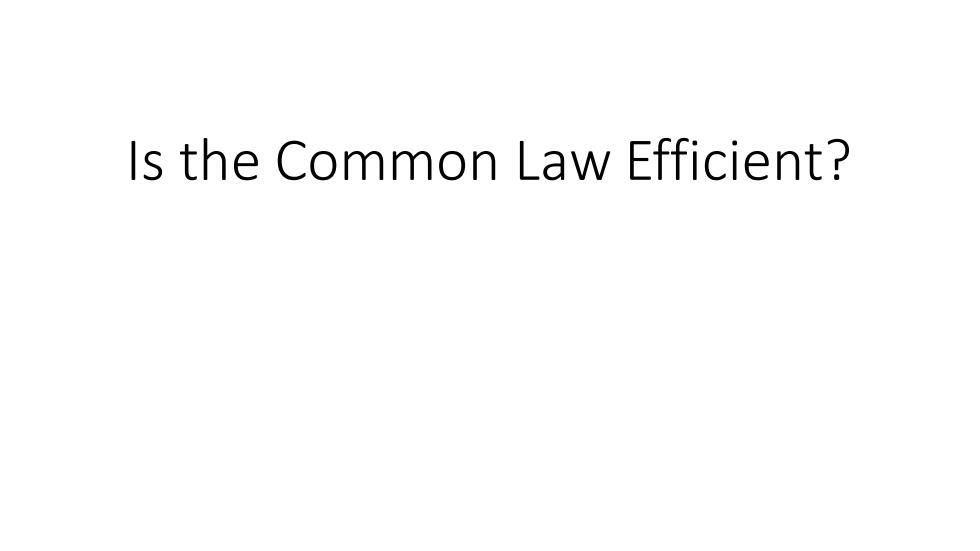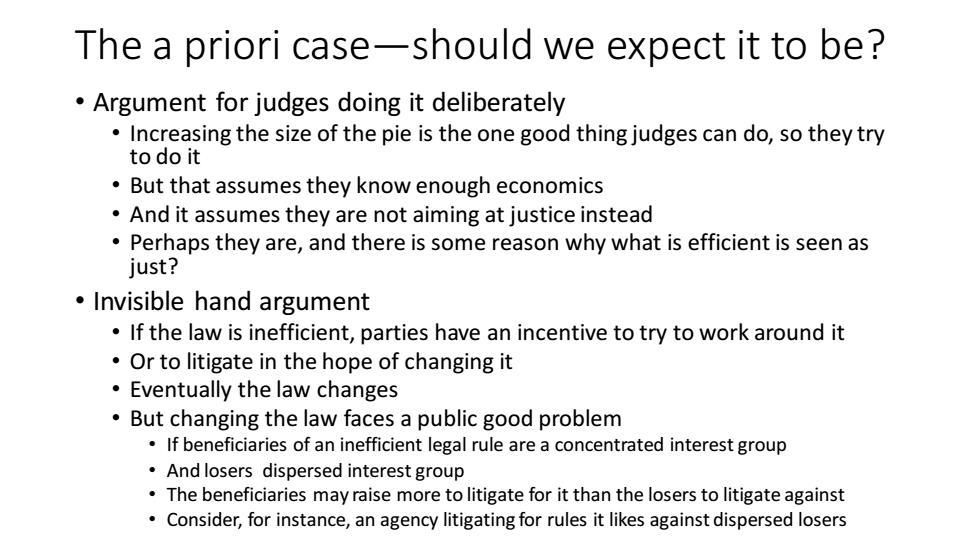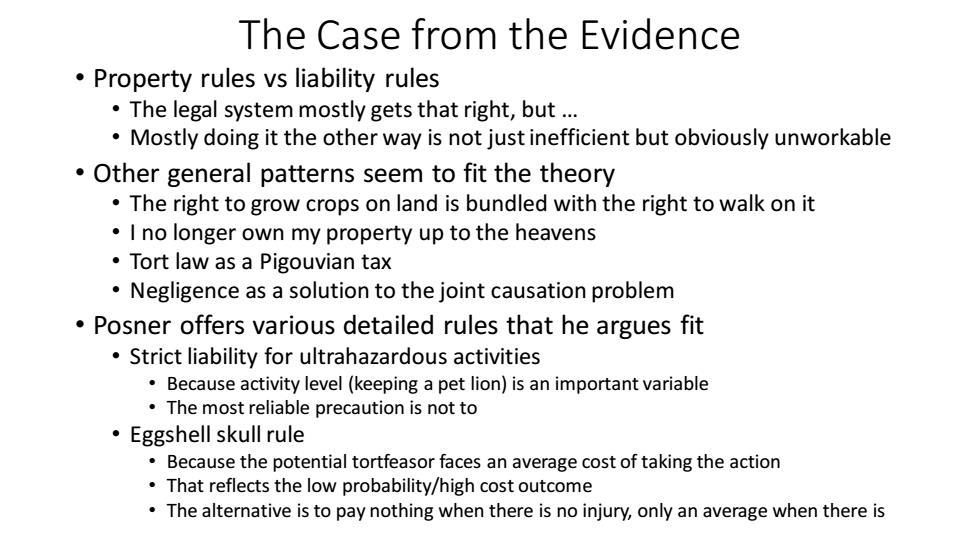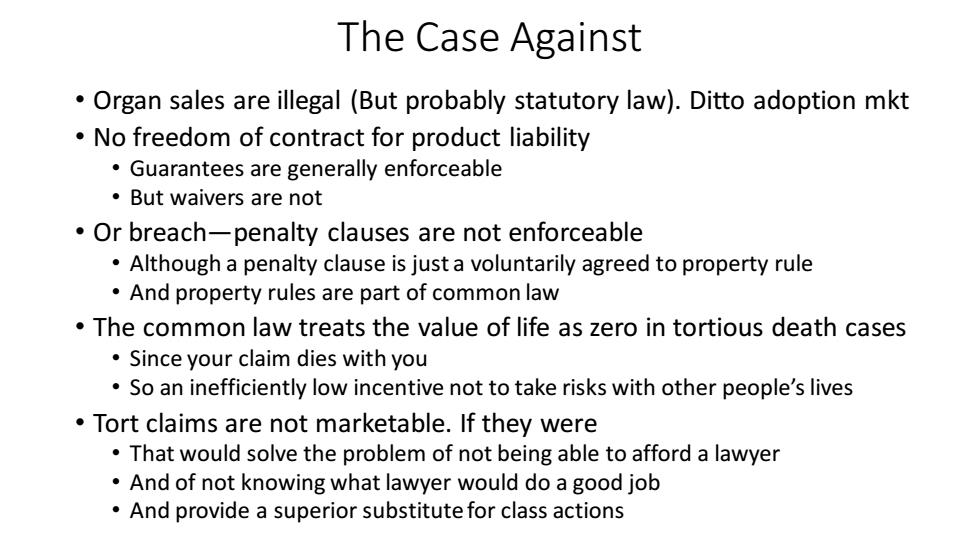
Is the Common Law Efficient?
Is the Common Law Efficient?

The a priori case-should we expect it to be? Argument for judges doing it deliberately Increasing the size of the pie is the one good thing judges can do,so they try to do it But that assumes they know enough economics And it assumes they are not aiming at justice instead Perhaps they are,and there is some reason why what is efficient is seen as just? Invisible hand argument If the law is inefficient,parties have an incentive to try to work around it Or to litigate in the hope of changing it Eventually the law changes But changing the law faces a public good problem If beneficiaries of an inefficient legal rule are a concentrated interest group And losers dispersed interest group The beneficiaries may raise more to litigate for it than the losers to litigate against Consider,for instance,an agency litigating for rules it likes against dispersed losers
The a priori case—should we expect it to be? • Argument for judges doing it deliberately • Increasing the size of the pie is the one good thing judges can do, so they try to do it • But that assumes they know enough economics • And it assumes they are not aiming at justice instead • Perhaps they are, and there is some reason why what is efficient is seen as just? • Invisible hand argument • If the law is inefficient, parties have an incentive to try to work around it • Or to litigate in the hope of changing it • Eventually the law changes • But changing the law faces a public good problem • If beneficiaries of an inefficient legal rule are a concentrated interest group • And losers dispersed interest group • The beneficiaries may raise more to litigate for it than the losers to litigate against • Consider, for instance, an agency litigating for rules it likes against dispersed losers

The Case from the Evidence Property rules vs liability rules The legal system mostly gets that right,but... Mostly doing it the other way is not just inefficient but obviously unworkable Other general patterns seem to fit the theory The right to grow crops on land is bundled with the right to walk on it I no longer own my property up to the heavens Tort law as a Pigouvian tax Negligence as a solution to the joint causation problem Posner offers various detailed rules that he argues fit Strict liability for ultrahazardous activities Because activity level(keeping a pet lion)is an important variable The most reliable precaution is not to ·Eggshell skull rule Because the potential tortfeasor faces an average cost of taking the action That reflects the low probability/high cost outcome The alternative is to pay nothing when there is no injury,only an average when there is
The Case from the Evidence • Property rules vs liability rules • The legal system mostly gets that right, but … • Mostly doing it the other way is not just inefficient but obviously unworkable • Other general patterns seem to fit the theory • The right to grow crops on land is bundled with the right to walk on it • I no longer own my property up to the heavens • Tort law as a Pigouvian tax • Negligence as a solution to the joint causation problem • Posner offers various detailed rules that he argues fit • Strict liability for ultrahazardous activities • Because activity level (keeping a pet lion) is an important variable • The most reliable precaution is not to • Eggshell skull rule • Because the potential tortfeasor faces an average cost of taking the action • That reflects the low probability/high cost outcome • The alternative is to pay nothing when there is no injury, only an average when there is

The Case Against Organ sales are illegal(But probably statutory law).Ditto adoption mkt No freedom of contract for product liability Guarantees are generally enforceable ·But waivers are not Or breach-penalty clauses are not enforceable Although a penalty clause is just a voluntarily agreed to property rule And property rules are part of common law The common law treats the value of life as zero in tortious death cases Since your claim dies with you So an inefficiently low incentive not to take risks with other people's lives Tort claims are not marketable.If they were That would solve the problem of not being able to afford a lawyer And of not knowing what lawyer would do a good job And provide a superior substitute for class actions
The Case Against • Organ sales are illegal (But probably statutory law). Ditto adoption mkt • No freedom of contract for product liability • Guarantees are generally enforceable • But waivers are not • Or breach—penalty clauses are not enforceable • Although a penalty clause is just a voluntarily agreed to property rule • And property rules are part of common law • The common law treats the value of life as zero in tortious death cases • Since your claim dies with you • So an inefficiently low incentive not to take risks with other people’s lives • Tort claims are not marketable. If they were • That would solve the problem of not being able to afford a lawyer • And of not knowing what lawyer would do a good job • And provide a superior substitute for class actions